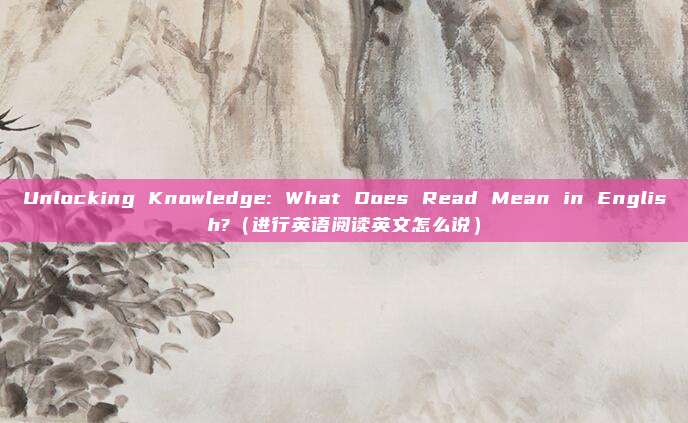Unlocking Knowledge: What Does Read Mean in English?(进行英语阅读英文怎么说)
温馨提示:这篇文章已超过237天没有更新,请注意相关的内容是否还可用!
In the age of digital information, the ability to communicate and understand content across languages has become increasingly important. For those who are learning English, understanding the various nuances of the language, including the translation of common phrases like "what does 'read' mean in English?" is crucial. This article delves into the meaning of "read" in English, explores related terms, and provides practical insights for learners and professionals alike.
Understanding "Read" in English
The verb "read" is a fundamental English word that has several meanings and uses. At its core, "read" refers to the act of looking at written words and understanding them. Here's a breakdown of some common interpretations:
1、To Look at Written Texts: When we say "read" in the most basic sense, we are referring to the physical act of turning pages or scrolling through a document and absorbing the written information.

- Synonyms: look at, examine, peruse
2、To Comprehend Information: The act of reading doesn't stop at merely looking at words. It also involves understanding the meaning and implications of the text.
- Synonyms: understand, interpret, grasp
3、To Study or Learn: In a more formal context, "read" can also mean to study a subject thoroughly, often implying deep engagement with the material.
- Synonyms: study, learn, absorb
4、To Read Out Loud: This is the act of reading text aloud, which can be done for various reasons, such as public speaking, storytelling, or reading instructions.
- Synonyms: recite, read aloud, read out
Practical Usage of "Read" in English
Understanding the various nuances of "read" in English can help you communicate more effectively. Here are some practical examples:
Reading a Book: "I enjoy reading a good novel before bed."
Reading an Email: "Please read the attached report and provide feedback by Friday."
Reading a Menu: "I'll have the grilled chicken, please; can you read the dressing options?"
Reading a Recipe: "Let's read the recipe together and make sure we have all the ingredients."
Importance in Academic and Professional Settings
In academic and professional environments, the ability to read and interpret information is paramount. For instance:
Academic Research: "In this study, we read a wide range of scholarly articles to understand the current trends in our field."
Professional Development: "Reading industry reports and journals is essential for staying up-to-date with the latest trends."
Communication: "To ensure clarity, always read your emails and memos before sending them."
Conclusion
Understanding the meaning of "read" in English, along with its synonyms and related terms, is a vital skill for anyone looking to improve their language proficiency and communication skills. Whether you're a student, professional, or simply someone interested in learning English, grasping the intricacies of this verb can open up a world of knowledge and opportunities. Remember, reading is not just about the words on the page; it's about the understanding and insight you gain from them.
References
- Cambridge Dictionary: [Definition of "read"](https://dictionary.cambridge.org/dictionary/english/read)
- Oxford University Press: [Synonyms of "read"](https://www.oxforddictionaries.com/definition/read)
- The Guardian: [The Importance of Reading](https://www.theguardian.com/books/2017/jan/07/the-importance-of-reading-books)
This article aims to provide a comprehensive guide to the English verb "read," ensuring that readers have a clear understanding of its various meanings and uses.
网站文章、图片来源于网络,以不营利的目的分享经验知识,版权归原作者所有。如有侵权请联系删除!





还没有评论,来说两句吧...